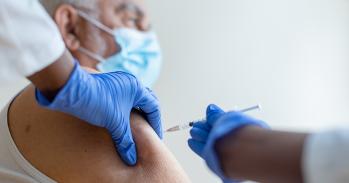
COVID-19 vaccinations that combine two or more distinct variants of the SARS-CoV-2 virus could offer protection against both current and future ‘variants of concern’, say scientists at the University of Cambridge and Medical University of Innsbruck.
COVID-19 vaccinations that combine two or more distinct variants of the SARS-CoV-2 virus could offer protection against both current and future ‘variants of concern’, say scientists at the University of Cambridge and Medical University of Innsbruck.
Our work suggests that an update of the vaccine variant will be beneficial for increasing antibody levels and thereby protection against all currently circulating variants
Antonia Netzl
In research published in Nature Communications, scientists show that the omicron variant of the virus is immunologically distinct from other variants such as the vaccine variant and the alpha and delta variants – that is, exposure to it has a different effect on the neutralising antibody response and hence protection to other variants. But also, sub-variants of omicron are themselves distinct from each other. Their research further suggests that a combination of infection plus vaccination could provide increased protection against future variants.
Since SARS-CoV-2 was first identified in 2020, new variants of the virus have emerged as its genetic code evolves. Some of these variants threaten to spread faster, be more virulent or evade the protection of the vaccine – these are known as ‘variants of concern’.
Antonia Netzl, a PhD student at Trinity Hall, Cambridge, together with colleagues at Cambridge and Innsbruck, analysed data on people’s immune responses to different variants and vaccinations. They used these to create ‘antigenic maps’ and ‘antibody landscapes’ to explore the differences between variants.
A more recent variant of concern is the omicron variant, but since its emergence in December 2021 several sub-lineages have evolved, including BA.1, BA.2, BA.4, BA.5, and BA.2.12.1. Of these, BA.5 became the dominant variant in many countries earlier this year, though new dominant variants have subsequently supplanted it.
Netzl and colleagues found, using their maps, that not only was omicron immunologically distinct from alpha and delta, but its sub-variants BA.1, BA.2 and BA.5 were also distinct from each other. The antibody landscapes, an illustration of people’s immune profile, allowed the researchers to see how vaccination and/or infection with another variant increased virus neutralisation against other viruses.
Netzl, a Gates Cambridge Scholar, said: “We found that people who had been exposed to BA.1 were better protected against BA.2, but the reverse wasn’t true.
“But the good news was that we also found that two distinct exposures – for example, vaccination plus infection with a different variant – increased antibody levels against all variants. So, people who had been vaccinated and then infected with delta, for example, were better protected against omicron than those who had only been vaccinated or infected and not both.”
Netzl says this suggests that an update of the vaccine variant will be beneficial for increasing antibody levels and thereby offering some protection against all currently circulating variants as well as yet-unknown variants.
“Our work suggests that an update of the vaccine variant will be beneficial for increasing antibody levels and thereby protection against all currently circulating variants. The bivalent vaccines, which contain the original prototype variant and an omicron variant in a single vaccine dose, could provide this increased protection.”
The findings are supported by clinical trials and have already been put into practice with the roll-out of the bivalent Prototype+omicron BA.4/5 and Prototype+omicron BA.1 vaccines.
Although infection by multiple different variants gives the unvaccinated protection too, Netzl points out that vaccinations offer effective protection and reduce the severity of infection.
“People should still make sure they get themselves vaccinated, even if they have already had COVID once. Vaccination is important for boosting our immune response and thereby reducing the risk of infection and symptom severity.”
Netzl said the research, alongside the real-world clinical trials, gives a strong basis to the investigations in vaccine development and design.
This research was carried out at the University of Cambridge and the Janine Kimpel Group at the University of Innsbruck. The co-lead authors were Antonia Netzl and Annika Rössler.
Reference
Rössler, A, Netzl, A, et al. BA.2 and BA.5 omicron differ immunologically from both BA.1 omicron and pre-omicron variants. Nat Comm; 13 Dec 2022; DOI: 10.1038/s41467-022-35312-3

The text in this work is licensed under a Creative Commons Attribution 4.0 International License. Images, including our videos, are Copyright ©University of Cambridge and licensors/contributors as identified. All rights reserved. We make our image and video content available in a number of ways – as here, on our main website under its Terms and conditions, and on a range of channels including social media that permit your use and sharing of our content under their respective Terms.




